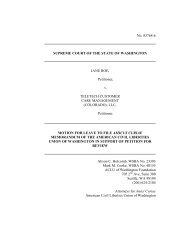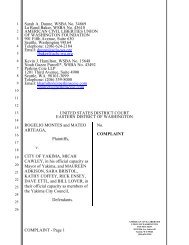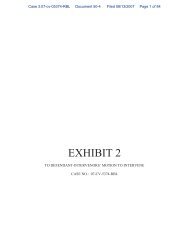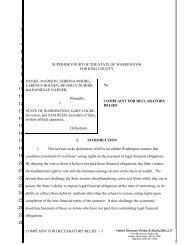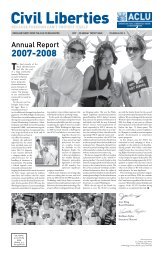BERGER v. CITY OF SEATTLE - ACLU of Washington
BERGER v. CITY OF SEATTLE - ACLU of Washington
BERGER v. CITY OF SEATTLE - ACLU of Washington
Create successful ePaper yourself
Turn your PDF publications into a flip-book with our unique Google optimized e-Paper software.
<strong>BERGER</strong> v. <strong>CITY</strong> <strong>OF</strong> <strong>SEATTLE</strong><br />
253<br />
application and the temporal hurdle <strong>of</strong> waiting for the permit<br />
to be granted may discourage potential speakers.” Id.; see also<br />
N.A.A.C.P., Western Region v. City <strong>of</strong> Richmond, 743 F.2d<br />
1346, 1355 (9th Cir. 1984) (“The simple knowledge that one<br />
must inform the government <strong>of</strong> his desire to speak and must<br />
fill out appropriate forms and comply with applicable regulations<br />
inhibits speech.”); Rosen, 641 F.2d at 1249 (advance<br />
notice “drastically burden[s] free speech”). So, although the<br />
Grossman permitting scheme did, unlike the permitting rule<br />
here, purport to serve the significant governmental interest <strong>of</strong><br />
coordinating the use <strong>of</strong> public space, the burdens it created<br />
were too large to be endured. 33 F.3d at 1208-09.<br />
We have taken these burdens very seriously: In Rosen,<br />
where the permit ordinance required only one day’s notice<br />
and advance disclosure <strong>of</strong> the name <strong>of</strong> the speaker, we struck<br />
it down, holding that the “interest in knowing in advance what<br />
type <strong>of</strong> free speech activities may occur . . . is insufficient to<br />
justify an ordinance so broad in its application and with so<br />
chilling an impact on the exercise <strong>of</strong> [F]irst [A]mendment<br />
rights.” 641 F.2d at 1249.<br />
The Seattle Center scheme is not only unsupported by a<br />
governmental coordination interest; it also reaches individual<br />
speakers. 5 This reach alone renders it suspect. When we have<br />
allowed coordination permits it has been for large groups: “As<br />
the cautionary language in our earlier opinions indicates, the<br />
significant governmental interest justifying the unusual step<br />
<strong>of</strong> requiring citizens to inform the government in advance <strong>of</strong><br />
expressive activity has always been understood to arise only<br />
when large groups <strong>of</strong> people travel together on streets and<br />
sidewalks.” Santa Monica Food Not Bombs, 450 F.3d at<br />
1039; see also Grossman, 33 F.3d at 1206 (“Some type <strong>of</strong><br />
permit requirement may be justified in the case <strong>of</strong> large<br />
5 The two features are, <strong>of</strong> course, closely related. Only large groups <strong>of</strong><br />
people in public parks and on public streets create a need for coordination<br />
<strong>of</strong> uses <strong>of</strong> public space.




